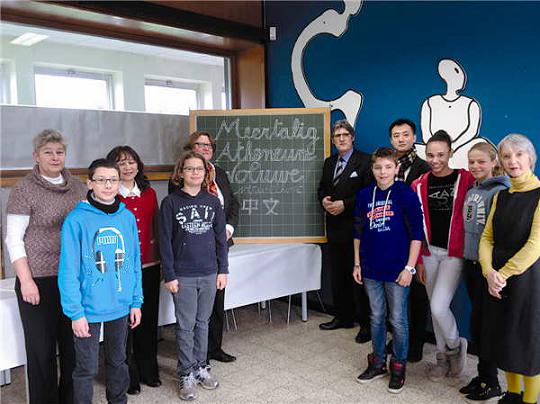
 |
| Chinese class staff and students from Koninklijk Atheneum Sint-Pieters-Woluwe middle school. (Tuo Yanna / China Daily) |
In 2012, EU investment in China reached more than $6 billion, while $3.4 billion went from China into the EU, according to official data.
Rising demand
"During the past two years, the demand for Chinese has been the highest among all the language classes. That wasn't the case a few years ago, but now our biggest classes are for Chinese," said Eddy Johnson from the language training institute Scholengroep Brussel.
For many years, French, Russian and Spanish were the most popular courses among European Union and Commission staff, but as Johnson noted, Chinese and Arabic are now the languages of choice.
The Chinese class has about 60 students at different levels of proficiency, and the reasons for joining vary. One of the students, Demur Gaspard, who works for the European Commission, is learning Chinese to help him at work. "I deal mainly with Chinese affairs, so I'm learning the language for professional reasons," he said.
Apart from work-related reasons, many officials are learning Chinese for their own enjoyment. Tami Julien, director-general of development and cooperation at the European Commission, said his work mainly involves African issues, so for him learning Chinese is more about personal enjoyment.
One European Commission translator, who wanted to be known simply as Victor, has worked for international organizations for 25 years. He speaks fluent Spanish, Italian, English and French and is now learning Chinese: "I think Chinese is a very important language. I'm interested in learning about the country's culture and language. Also it's my obligation to stay up to date."


















 Now you can use mobile phone to 'call' the dead
Now you can use mobile phone to 'call' the dead


![]()
